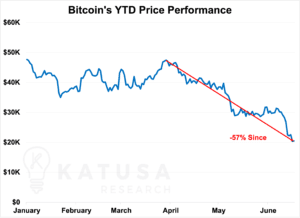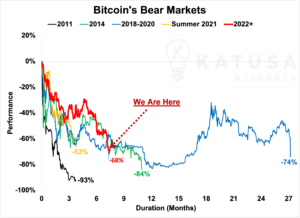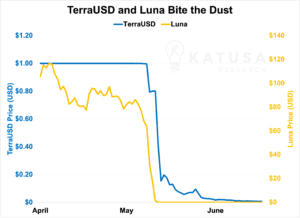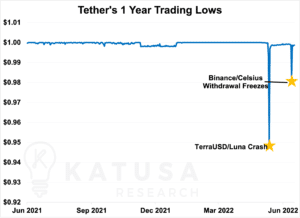
History rhymes.Investors will always chase what’s hot (including pixelated images of gorillas valued at hundreds of thousands of dollars)…Then immediately think “just get me out!” when it’s not. The common-sense indicator never fails.It’s been a tough couple of weeks for most market sectors, but for crypto especially.And there’s one major question…
How Far Will Crypto Chaos Spread
If you aren’t in the know, here’s what the chart for Bitcoin looks like year-to-date:

The Bitcoin market has been in freefall since late April when it last traded above the $40,000 waterline.
Bitcoin’s Bear Markets
Like many other volatile asset classes, bitcoin’s highs and lows will leave even the most diamond hands HODLers sweating. This current swing is no different. Bitcoin is down 68% in this recent downturn.Anyone who has levered up in crypto for more than a day-trade is on the verge of liquidation.So, let’s put Bitcoin’s historical “corrections” or crashes into perspective…

If history is any indication, both the duration of the bear market and the severity of the decline aren’t finished yet. The red arrow pointing to “here” is where the current price drop is relative to the other 4 major price drops in Bitcoins history.
Have Fun Staying Getting Poor
Bitcoin has always been a volatile asset.The constant battle between diehard HODLers and naysayers has seen Bitcoin jump over 600% before falling by 70% in just the last 2 years alone.Tell tale signs of market tops are always evident in the rear-view mirror and in hindsight.But I’ve seen my share of bull markets and what accompanies them…
- Laser eyes
- Shaming anyone not “in” with lines like “Have fun staying poor”
- Displays of Excess (bragging of Lamborghini’s, boats, celebrities at parties and events)
I was reminded of the time a senior member of KR went to a conference and was invited to a VIP dinner during the cannabis boom.Executives of a company that just raised $20 million were spending lavishly on dinner and magnum bottles of vintage wines.“Everyone was congratulating each other, but all they had was investors’ money and nothing tangible to show for it. Or in the pipeline,” he told me.The industry spiraled soon after.Sound familiar?
The Stablecoin Spiral – Are Stablecoins Really “Stable”?
There was a series of events that played a major part in Bitcoin’s most recent downturn.It’s related to something known as “stablecoins”.It’s a fairly old innovation on the cryptocurrency timeline, with the first ones launched all the way back in 2014.
- A stablecoin is any cryptocurrency that’s pegged to a different asset. Like a real currency, commodities, or even another cryptocurrency.
A simple example of a peg would be the former gold standard.Back in the post-WWII era, under the Bretton Woods system, the U.S. Dollar was pegged to gold.You could convert an ounce of gold to $35 USD, and vice versa. Stablecoins operate under the same idea.One of the most popular stablecoins, is Tether, also known as USDT.Every Tether coin is backed by one U.S. Dollar, giving it a 1:1 peg with the currency and stabilizing the price of USDT at $1 USD.In theory, this means that a Tether holder can convert their coins for dollars at any time.This low-price volatility, combined with the guarantee of an asset backing the coin, has made stablecoins very popular investments.
- Tether, the leading stablecoin, regularly out-trades Bitcoin itself in terms of dollar volume.
Recent events, however, have caused investors to rethink just how stable these stablecoins really are…
The Wrong Way to the Moon
The first sign of trouble came in early May, when the stablecoin TerraUSD and its sister currency Luna crashed:

As a brief background, TerraUSD was an algorithmic stablecoin. Though its value was tied to the U.S. Dollar much like USDT, the way it did this was much more complicated than a simple peg.Terra’s sister coin, Luna, was used to keep the price of Terra in check.By selling off Luna to create new Terra coins or vice versa, the price of Terra was maintained at the $1 USD mark. Thanks to an algorithm designed by the coins’ developers.This algorithm broke down last month catastrophically.Previously, almost 75% of the total circulation of Terra was held in a lending and borrowing system known as the Anchor Protocol.Holders of Terra were rewarded for parking their coins in the Anchor Protocol with a fixed 20% interest rate.A 20% yield is a red flag on the commonsense indicator.Rumors that Anchor was changing their fixed interest rates to variable ones, however, triggered massive withdrawals of Terra.As more and more people decided to sell their Terra, this caused the supply of Luna to shoot up.The oversupply led both Terra and Luna to a price crash.This vaporized $40 billion of market value and left many hopeful crypto investors empty-handed.
- KEY LESSON: Beware of markets that can get illiquid FAST.
The Contagion Spreads
Shortly after Terra’s initial drop, widespread worry over the situation would spread to the other stablecoins.And not even Tether, the poster boy of the stablecoin market, was spared:

Despite a supposed 1:1 backing to the U.S. dollar, Tether fell as low 95 cents in the wake of Terra’s collapse.It was a clear sign that crypto investors had their confidence in stablecoins shaken.And just last week, Tether’s peg was tested once again…Two major crypto firms, Celsius and Binance, froze client withdrawals.The fresh wave of fear that followed this news would again cause Tether to briefly slip to $0.9812, well outside its usual trading range of $0.999-$1.001.On top of this, there’s major concern over Tether’s fiat currency backing…It isn’t held solely in cash but also partly in things like commercial paper (unsecured short-term debt). This is alarming to stablecoin investors.
If Tether Cracks – LOOK OUT
This isn’t a new issue – Back in 2021, Tether was banned from and fined $18.5 million by the city of New York for lying about their cash reserves.The office of New York’s attorney general found during their investigation that Tether had not been fully backed by U.S. dollars 1:1 at several points in 2017 and 2018.Tether has refuted rumors about the composition of its commercial paper holdings and has committed to eliminating all corporate debt from its portfolio.But it’s clear that investor faith in the stablecoin is not as solid as it used to be.And if what happened to Terra were to happen to Tether…One analyst has said it would be like a ‘Lehman Brothers moment’ for the crypto markets.
Those Who Fail to Learn from History…
As one Reddit user so eloquently pointed out, right now the crypto markets are “speed running” through the late 19th and early 20th century of banking.Ponzi and pyramid schemes, the slow shift towards fractional reserve banking, uninsured and unregulated banks, exit scams, and bank heists…It’s the Wild West all over again in the crypto markets, only it’s playing in fast forward.Bitcoin’s current situation is a far cry from what the author of the S2FX model (here’s my unbiased take on it), who rode BTC from $69k all the way down to $20k, thought it would be.In fact, the loudest voices stopped pounding the table on S2FX in their recent Twitter posts. Now there’s more talk of alternative trading indicators and models, as well as proper portfolio allocation.But as I constantly have to remind my haters – I’m not blindly bashing crypto.All I’m trying to say is that with all the hype and baseless optimism surrounding the crypto markets…You need to be careful with your money, and selective with your investments.That’s how I manage my own portfolio.And if you want to see exactly how I’m preparing to deploy my capital in these times of uncertainty, click here to get my premium newsletter.It details how I stay defensive with my own money…When most others are losing their heads with greed and fear.Regards,Marin






